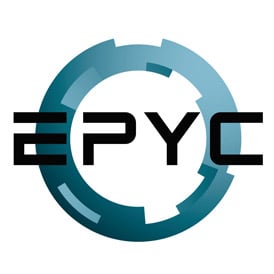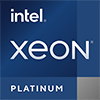
AMD EPYC 7542 Benchmark, Test and specs
Last updated:
The AMD EPYC 7542 has 32 cores with 64 threads and is based on the 2. gen of the AMD EPYC series. The processor uses a mainboard with the SP3 socket and was released in Q3/2019. The AMD EPYC 7542 scores 1,013 points in the Geekbench 5 single-core benchmark. In the Geekbench 5 multi-core benchmark, the result is 26,749 points.

| Name: | AMD EPYC 7542 |
|---|---|
| Family: | AMD EPYC (129) |
| CPU group: | AMD EPYC 7002 (24) |
| Architecture: | Rome (Zen 2) |
| Segment: | Desktop / Server |
| Generation: | 2 |
| Predecessor: | -- |
| Successor: | -- |
CPU Cores and Base Frequency
The AMD EPYC 7542 has 32 CPU cores and can calculate 64 threads in parallel. The clock frequency of the AMD EPYC 7542 is 2.90 GHz (3.40 GHz). The number of CPU cores greatly affects the speed of the processor and is an important performance indicator.
| CPU Cores / Threads: | 32 / 64 |
|---|---|
| Core architecture: | normal |
| Cores: | 32x |
| Hyperthreading / SMT: | Yes |
|---|---|
| Overclocking: | No |
| Frequency: | 2.90 GHz |
| Turbo Frequency (1 Core): | 3.40 GHz |
| Turbo Frequency (32 Cores): | 3.20 GHz |
Memory & PCIeThe processor can use up to memory in 8 (Octa Channel) memory channels. The maximum memory bandwidth is 51.2 GB/s. The memory type as well as the amount of memory can greatly affect the speed of the system. |
|
| Memory type: | Memory bandwidth: |
|---|---|
| DDR4-3200 | 51.2 GB/s |
| Max. Memory: | |
| Memory channels: | 8 (Octa Channel) |
| ECC: | Yes |
| PCIe: | 4.0 x 128 |
| PCIe Bandwidth: | 252.0 GB/s |
Thermal ManagementThe thermal design power (TDP for short) of the processor is 225 W. The TDP specifies the necessary cooling solution that is required to cool the processor sufficiently. The TDP usually gives a rough idea of the actual power consumption of the CPU. |
|
|---|---|
| TDP (PL1 / PBP): | 225 W |
| TDP (PL2): | -- |
| TDP up: | -- |
| TDP down: | -- |
| Tjunction max.: | -- |
Technical details
The AMD EPYC 7542 is made in 7 nm. The smaller the manufacturing process of a CPU, the more modern and energy-efficient it is. Overall, the processor has 128.00 MB cache. A large cache can greatly speed up the processor's speed in some cases such as games.
| Technology: | 7 nm |
|---|---|
| Chip design: | Chiplet |
| Socket: | SP3 |
| L2-Cache: | -- |
| L3-Cache: | 128.00 MB |
| AES-NI: | Yes |
| Operating systems: | Windows 10, Linux |
| Virtualization: | AMD-V, SVM |
|---|---|
| Instruction set (ISA): | x86-64 (64 bit) |
| ISA extensions: | SSE4a, SSE4.1, SSE4.2, AVX2, FMA3 |
| Release date: | Q3/2019 |
| Release price: | 6000 $ |
| Part Number: | -- |
| Documents: | Technical data sheet |
Rate this processor
Benchmark results

The benchmark results for the AMD EPYC 7542 have been carefully checked by us. We only publish benchmark results that have been created by us or that have been submitted by a visitor and then checked by a team member. All results are based on and fullfill our benchmark guidelines.
Geekbench 5, 64bit (Single-Core)
Geekbench 5 is a cross plattform benchmark that heavily uses the systems memory. A fast memory will push the result a lot. The single-core test only uses one CPU core, the amount of cores or hyperthreading ability doesn't count.

|
Microsoft XBox Series S
8C 16T @ 3.60 GHz |
||

|
Intel Core i7-7920HQ
4C 8T @ 4.10 GHz |
||

|
Intel Xeon Gold 5218N
16C 32T @ 3.70 GHz |
||
|
|
AMD EPYC 7542
32C 64T @ 3.40 GHz |
||

|
AMD Ryzen 3 2300X
4C 4T @ 4.00 GHz |
||

|
Intel Core i7-5775R
4C 8T @ 3.80 GHz |
||

|
Intel Xeon E3-1245 v3
4C 8T @ 3.80 GHz |
||
Geekbench 5, 64bit (Multi-Core)
Geekbench 5 is a cross plattform benchmark that heavily uses the systems memory. A fast memory will push the result a lot. The multi-core test involves all CPU cores and taks a big advantage of hyperthreading.

|
Intel Core i9-14900K
24C 32T @ 5.70 GHz |
||

|
Intel Core i9-14900KF
24C 32T @ 5.70 GHz |
||

|
Intel Xeon Gold 6314U
32C 64T @ 2.70 GHz |
||
|
|
AMD EPYC 7542
32C 64T @ 3.20 GHz |
||

|
AMD EPYC 7502
32C 64T @ 3.00 GHz |
||

|
AMD EPYC 7452
32C 64T @ 2.65 GHz |
||

|
AMD EPYC 7443
24C 48T @ 3.60 GHz |
||
Geekbench 6 (Single-Core)
Geekbench 6 is a benchmark for modern computers, notebooks and smartphones. What is new is an optimized utilization of newer CPU architectures, e.g. based on the big.LITTLE concept and combining CPU cores of different sizes. The single-core benchmark only evaluates the performance of the fastest CPU core, the number of CPU cores in a processor is irrelevant here.

|
Intel Xeon W-3245M
16C 32T @ 4.60 GHz |
||

|
Intel Core i7-8650U
4C 8T @ 4.20 GHz |
||

|
Intel Core i7-9800X
8C 16T @ 4.50 GHz |
||
|
|
AMD EPYC 7542
32C 64T @ 3.40 GHz |
||

|
Intel Core i7-8709G
4C 8T @ 4.10 GHz |
||

|
Intel Core i3-10105T
4C 8T @ 3.90 GHz |
||

|
Intel Core i3-10300T
4C 8T @ 3.90 GHz |
||
Geekbench 6 (Multi-Core)
Geekbench 6 is a benchmark for modern computers, notebooks and smartphones. What is new is an optimized utilization of newer CPU architectures, e.g. based on the big.LITTLE concept and combining CPU cores of different sizes. The multi-core benchmark evaluates the performance of all of the processor's CPU cores. Virtual thread improvements such as AMD SMT or Intel's Hyper-Threading have a positive impact on the benchmark result.

|
Intel Core i9-12900HX
16C 24T @ 2.30 GHz |
||

|
Intel Core i7-13850HX
20C 28T @ 4.40 GHz |
||

|
Intel Core i7-14650HX
16C 24T @ 2.20 GHz |
||
|
|
AMD EPYC 7542
32C 64T @ 3.20 GHz |
||

|
AMD Ryzen 7 PRO 8700G
8C 16T @ 4.70 GHz |
||

|
AMD Ryzen 7 8700G
8C 16T @ 4.70 GHz |
||

|
AMD Ryzen 7 7800X3D
8C 16T @ 4.60 GHz |
||
Cinebench R20 (Single-Core)
Cinebench R20 is the successor of Cinebench R15 and is also based on the Cinema 4 Suite. Cinema 4 is a worldwide used software to create 3D forms. The single-core test only uses one CPU core, the amount of cores or hyperthreading ability doesn't count.

|
AMD EPYC 7262
8C 16T @ 3.40 GHz |
||

|
AMD EPYC 7742
64C 128T @ 3.40 GHz |
||

|
AMD Ryzen Threadripper 2990WX
32C 64T @ 4.20 GHz |
||
|
|
AMD EPYC 7542
32C 64T @ 3.40 GHz |
||

|
Intel Core i5-8300H
4C 8T @ 4.00 GHz |
||

|
Intel Core i5-10500TE
6C 12T @ 3.70 GHz |
||

|
Intel Core i5-10500T
6C 12T @ 3.80 GHz |
||
Estimated results for PassMark CPU Mark
Some of the CPUs listed below have been benchmarked by CPU-monkey. However the majority of CPUs have not been tested and the results have been estimated by a CPU-monkey’s secret proprietary formula. As such they do not accurately reflect the actual Passmark CPU mark values and are not endorsed by PassMark Software Pty Ltd.

|
Intel Xeon W-3375
38C 72T @ 3.20 GHz |
||

|
AMD Ryzen 9 7945HX
16C 32T @ 2.50 GHz |
||

|
AMD EPYC 7443P
24C 48T @ 3.60 GHz |
||
|
|
AMD EPYC 7542
32C 64T @ 3.20 GHz |
||

|
AMD EPYC 7543
32C 64T @ 3.30 GHz |
||

|
AMD Ryzen Threadripper 3960X
24C 48T @ 4.00 GHz |
||

|
AMD EPYC 7532
32C 64T @ 2.90 GHz |
||
Benchmarks

Geekbench 5 (SC)
2,488 entries
2,488 entries

Geekbench 5 (MC)
2,461 entries
2,461 entries

Geekbench 6 (SC)
1,755 entries
1,755 entries

Geekbench 6 (MC)
1,703 entries
1,703 entries

Cinebench R20 (SC)
656 entries
656 entries

PassMark CPU-Mark
2,392 entries
2,392 entries
Popular comparisons
back to index





